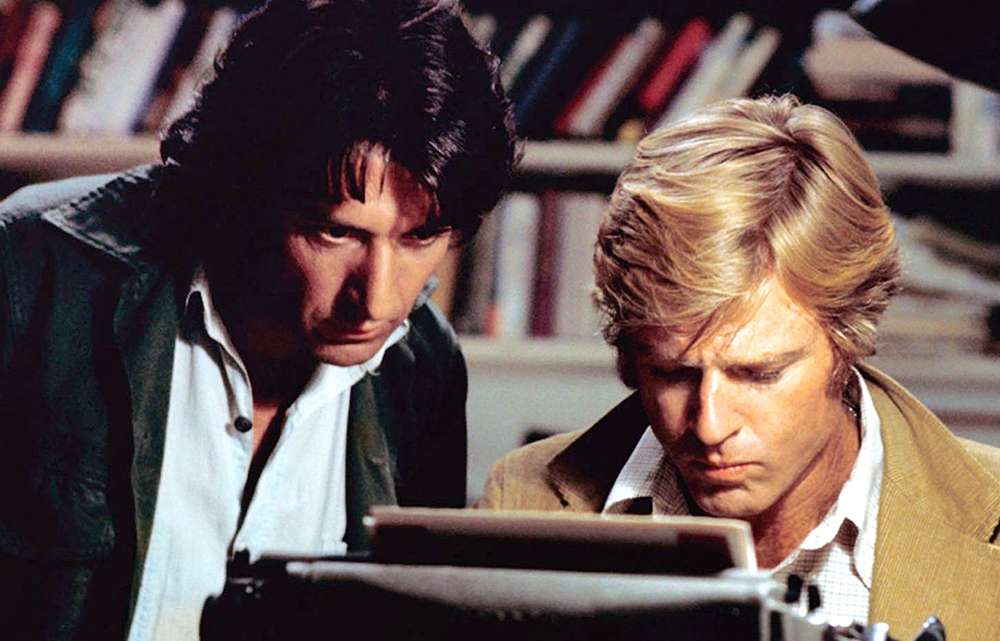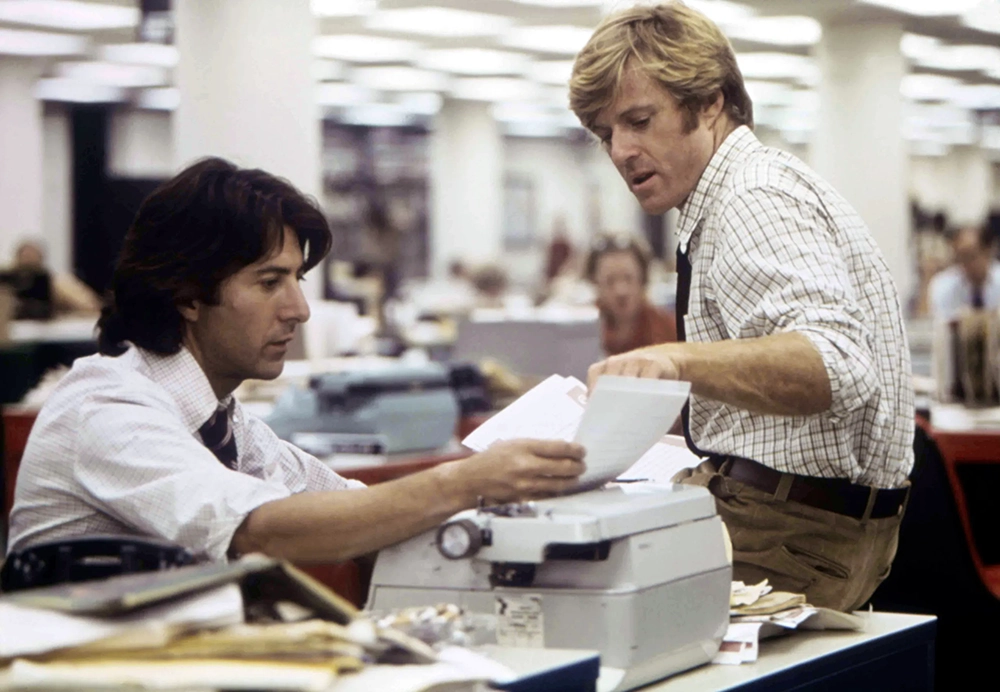While at the heart of Alan J. Pakula’s 1976 film “All the President’s Men” lies a political scandal, the film is a treatise on investigative journalism. The movie is based on a screenplay by William Goldman and the book of the same name by journalists Bob Woodward and Carl Bernstein. It explores these characters and humanizes them (Bernstein had flirted with termination throughout his career; Woodward was only nine months in when ‘Watergate’ broke), while also illuminating a time period where a major scandal like this wasn’t—until the duo’s exposés—that important to the general public. Looking back on the event now, in 2022, brings perspective. Watergate was exposed in steps (not in one shot like the excellent “Spotlight”). “President’s Men” brings us into the newsroom fully. Its only negative mark is it sometimes pushes Watergate’s story to the back in the process.
“President’s Men” has excellent casting. “The Graduate” a decade behind him, Dustin Hoffman plays Bernstein with the right amount of pushiness and veteranship the character deserves. Robert Redford, who had been grinding out classic films at this time (“The Great Gatsby,” “Three Days of the Condor,” “The Sting,” etc.), likewise fills Woodward’s shoes well. Getting scolded by his editor (a great Jack Warden) early on for not knowing a key political figure, it shows he has a lot to learn. But he has his nose to the grindstone. He gets the first lead on the Watergate case and runs with it. Unlike the aforementioned “Spotlight” or the forever-charming ’94 Ron Howard film “The Paper,” office drama is a minutia of this film. Most of it is dedicated to pounding on doors and making phone calls—“no comment” the usual rebuttal.
Bringing Viewers into the Newsroom
In this way, the newsroom of The Washington Post has the feel and demeanor that would be featured in Oliver Stone’s superlative “Wall Street” years later. But here, while the protagonists are pushy (they have to be), they’re polite. Redford plays more the straight man; he’s still learning the ropes and doesn’t want to push people too hard. Hoffman, however, has no problem with this tactic. It rubs off on Woodward through the film’s run-time; before long, pushiness, duplicity, and trip-ups become their modus operandi. You often feel you’re watching a detective exhaust a witness. However, the difference is here—for the most part—their subjects want to talk; they’re just afraid to.
Of course, “All the President’s Men” works because of its direction and focus, and Pakula does a solid job here. There’s a lot of frustration in the film as Woodward and Bernstein strike out and then find their way again. Gordon Willis is the Director of Photography, and the film often takes the look of one of a million action/thrillers that would line the ‘90s. You half expect henchmen with silencers to appear in the night, dealing with such a conspiracy in the making: but then you have to remind yourself this is real. This really happened. The absence of much of a score adds to the investigatory nature of the picture. Woodward and Bernstein’s apartments are a mess; the latter drinks too much coffee and the former gets too little sleep.
Uncovering One of America’s Greatest Political Scandals

The necessity of the film comes from the slow uncovering of the conspiracy’s players, and it’s here that “President’s Men” often comes too hard-hitting and too-fast. It assumes knowledge of history, and was certainly written for the time (releasing only two years after President Nixon’s resignation as a result of the scandal). Comparing this to films like 2020’s “The Trial of the Chicago 7” (also featuring Attorney General John Mitchell), which had the benefit of decades-removed history, knowledge of the events becomes more of a necessity. It spells little out for viewers. In this way, “President’s Men” can often feel like an onslaught of witnesses and sources, often without buildup. The breakdown sessions between Woodward and Bernstein become necessary to understand what we’ve just witnessed. At times, watching this, you can feel a little punch drunk.
I guess this is the film’s only true demerit—that it is more of a journalism picture than it is a historical epic of one of America’s biggest political scandals. You never truly feel like you’re uncovering Watergate. We occasionally see clippings on TV of then-President Nixon and related news events. However, we don’t see the inner-workings of the scandal itself. But maybe we’re not supposed to. Maybe “All the President’s Men’s” true accomplishment is to put us alongside Woodward and Bernstein and make us feel their frustration, exhaustion, and, by the end, their fear. It’s not just their jobs they’re fighting for, but truth, Democracy, the 1st Amendment, decency…their lives. Amidst this, we capture hints of the corruption that lines Washington from the shadowed character ‘Deep Throat,’ played well by the late Hal Holbrook.
A Procedural Film; but One that Holds Up

“All the President’s Men” is its most effective when it chronicles its journalism, and the picture’s obliviousness to the history that The Washington Post is in fact making. An editor warns the duo that polling shows that most Americans don’t show much concern for Watergate, and the implication is that they should, but they don’t. Pakula speckles his film with intriguing shots that highlight the hard work and necessity of the investigation; but none so poignant as one shot that shows a cross angle of Woodward and Bernstein typing their story as a television broadcasts the Republican Party renominating Richard Nixon, the duo unsure of where the story would go, us, the audience, knowing exactly where it would lead.
Does “All the President’s Men” hold up over time? I think so. Watergate’s effect certainly hasn’t waned any, and political scandals are still real, even if we’ve become jaded to them. The film deserves its four Oscar wins (not nabbing ‘Best Picture,’ which it lost to “Rocky”), and I think the reason it might not have gone all the way is its procedural nature. The film doesn’t end with a major ‘Exclusive’ newspaper drop and millions of Americans shocked and awed. The point of the film is the work that it took to get there. As it soaks in, and Woodward and Bernstein contemplate the film’s events, simple keystrokes relay the collapse of Nixon’s empire. We’re used to more pizzaz; sidestepping that may be “President’s Men” greatest strength or weakest link. But history is rarely ever that black and white.
“All the President’s Men” is now streaming on HBO Max. You can rent or stream it from on most streaming platforms.
Support the Site: Consider becoming a sponsor to unlock exclusive, member-only content and help support The Movie Buff!


